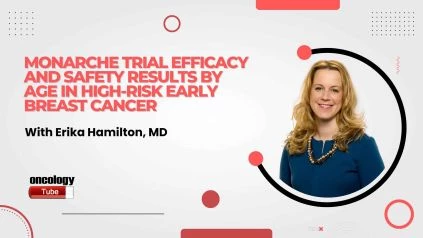Erika Hamilton, MD, a preeminent expert from the Sarah Cannon Research Institute, has recently conducted a study evaluating the efficacy and safety of adjuvant abemaciclib combined with endocrine therapy (ET) in patients with HR-positive, HER2-negative, node-positive, high-risk early breast cancer (EBC), with a focus on analyzing the results based on age groups.
The study, known as monarchE, aimed to provide valuable insights into the treatment outcomes of this specific patient population.
In the monarchE study, Dr. Hamilton and her team enrolled a diverse group of patients diagnosed with HR-positive, HER2-negative, node-positive EBC, which is considered a high-risk subtype.
The patients were divided into different age groups to evaluate the impact of age on the efficacy and safety of the adjuvant treatment.
The study included patients aged below 40, 40-49, 50-59, and 60 years or older.
The results of the study revealed that the combination of abemaciclib and endocrine therapy demonstrated consistent efficacy across all age groups.
The treatment significantly reduced the risk of invasive disease recurrence or death compared to endocrine therapy alone, thereby providing a substantial benefit for patients in each age category.
This finding suggests that age does not influence the efficacy of abemaciclib in improving outcomes for patients with HR-positive, HER2-negative, node-positive EBC.
Furthermore, the safety profile of the treatment combination was also assessed based on age.
The study found that the incidence of adverse events and serious adverse events was generally consistent across all age groups, with no unexpected safety concerns identified.
This indicates that the addition of abemaciclib to endocrine therapy does not pose a greater risk for older patients, debunking any concerns regarding age-related safety issues.
Dr. Hamilton’s findings from the monarchE study contribute significantly to our understanding of the optimal treatment approach for patients with HR-positive, HER2-negative, node-positive, high-risk EBC.
By demonstrating the consistent efficacy and safety of abemaciclib combined with endocrine therapy across different age groups, this research supports the use of this treatment combination as an effective adjuvant therapy for all eligible patients, regardless of age.
These results hold immense clinical significance as they provide oncologists with valuable evidence to guide treatment decisions for HR-positive, HER2-negative, node-positive, high-risk EBC patients.
By offering a personalized treatment approach that takes into account the patient’s individual characteristics rather than age alone, healthcare professionals can optimize outcomes and improve the overall management of early breast cancer.
Dr. Hamilton’s research serves as a crucial step forward in advancing the field of breast cancer treatment and ensuring that patients receive the most appropriate and effective therapies available.

